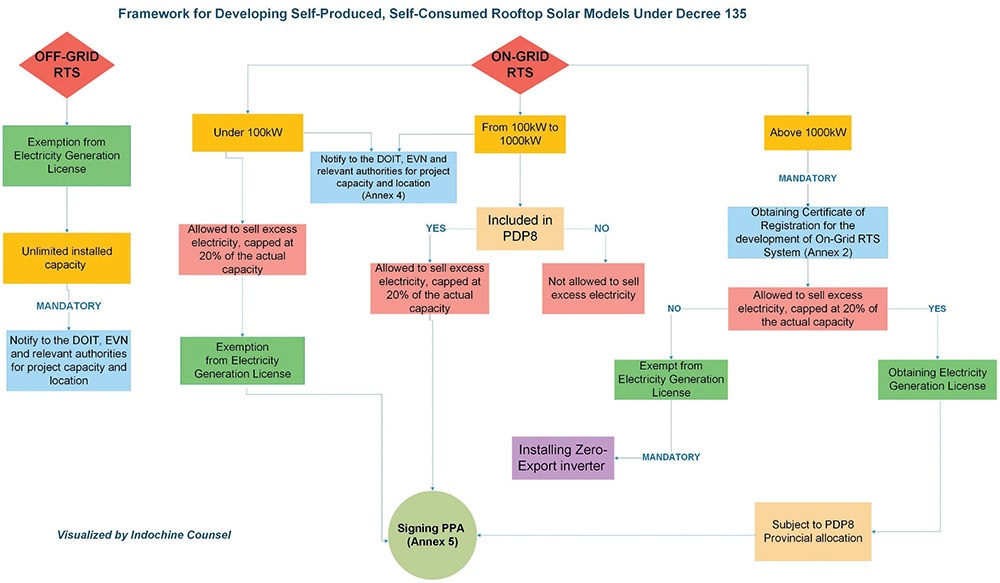Progression made in rooftop solar power development
Decree 135 marks a progressive step in the development of RSP power in Vietnam, offering both regulatory clarity and support for sustainable energy initiatives. However, it appears that the decree primarily promotes related systems for self-production and self-consumption by individuals, households, and businesses in order to increase green energy consumption nationwide and move closer to achieving the net-zero emission plan by 2050 by the government, rather than encouraging investment from professional investors.
Decree 135 brings several important adjustments and clarifications regarding RSP system models and outlines the process for selling surplus electricity to Vietnam Electricity (EVN).
 |
| Progression made in rooftop solar power development |
Self-produced and self-consumed electricity is defined as energy generated and used solely by consumers to meet their own needs. This definition as well as Decree 135 do not address the origin of the ownership of the RSP systems used to generate electricity, implying that consumers may legally acquire ownership of systems through purchase, borrowing, or renting.
The off-grid RSP system model applies to a self-produced and self-consumed RSP system not connecting to the national grid. While this model serves on-site needs of consumers, Decree 135 does not specify if it can be transferred to nearby facilities.
In developing this system, required licensing includes notifying the provincial Department of Industry and Trade (DoIT) and EVN about the system’s capacity and location, as well as other relevant construction and fire prevention and firefighting authorities. Importantly, the off-grid system is not required to obtain an electricity generation licence and not limited in its capacity.
Meanwhile, the on-grid model applies to a self-produced and self-consumed RSP system connecting to the national grid or on-site loads linked to the grid. Excess electricity generated from a system, limited to 20 per cent of installed capacity, can be sold to the national grid at the average market price of the previous year.
The sale of excess electricity is applicable to an RSP system that is within the electricity planning or with a capacity of below 100 kW. However, it should be noted that systems installed on the roof of a public office, or a construction work classified as public property are not allowed to sell excess electricity.
Required licensing involves notifying the DoIT (for systems below 1,000kW) or registering with the department as the case may be. Additionally, the system with an installed capacity of 1,000kW (or more) requires carrying out procedures for electricity planning with the competent authorities and obtaining an electricity generation licence.
Decree 135 includes five annexes that provide a pivotal administration process for developing RSP systems for self-production and self-consumption purposes.
Annex 1 is the template for registering the development of on-grid system with a capacity of 1,000kW or more; Annex 2 is the template for the certificate of registration for on-grid system with the same capacity; and Annex 3 is the template for reports by provincial people’s committees to the Ministry of Industry and Trade on RSP development for self-production and self-consumption businesses.
Meanwhile, Annex 4 is the template for notifying authorities regarding development of the on-grid system with a capacity of less than 1,000kW; and Annex 5 is the template for a power purchase agreement applicable to on-grid system when selling excess electricity to EVN under Decree 135.
The development of the RSP system is entitled to incentive policies in respect of tax incentives and simplified administrative procedures. The installation of the system does not require changes in land use purpose or construction function of the construction work where such a system is installed. Individual households are exempt from obtaining or adjusting their business licences when deploying their systems.
For RSP systems installed before January 2021 and eligible for EVN sale, consumers are not permitted to register to install additional systems at the same site. Systems installed after that date must be registered with competent authorities and may qualify to sell excess electricity if satisfying the decree’s conditions.
Phan Anh Vu, partner, Indochine Counsel
What the stars mean:
★ Poor ★ ★ Promising ★★★ Good ★★★★ Very good ★★★★★ Exceptional
Related Contents
Latest News
More News
- Trung Nam-Sideros River consortium wins bid for LNG venture (January 30, 2026 | 11:16)
- Vietnam moves towards market-based fuel management with E10 rollout (January 30, 2026 | 11:10)
- Envision Energy, REE Group partner on 128MW wind projects (January 30, 2026 | 10:58)
- Vingroup consults on carbon credits for electric vehicle charging network (January 28, 2026 | 11:04)
- Bac Ai Pumped Storage Hydropower Plant to enter peak construction phase (January 27, 2026 | 08:00)
- ASEAN could scale up sustainable aviation fuel by 2050 (January 24, 2026 | 10:19)
- 64,000 hectares of sea allocated for offshore wind surveys (January 22, 2026 | 20:23)
- EVN secures financing for Quang Trach II LNG power plant (January 17, 2026 | 15:55)
- PC1 teams up with DENZAI on regional wind projects (January 16, 2026 | 21:18)
- Innovation and ESG practices drive green transition in the digital era (January 16, 2026 | 16:51)

 Tag:
Tag:




















 Mobile Version
Mobile Version